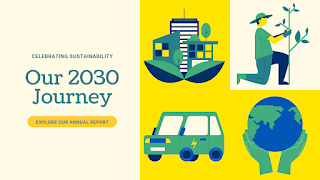Sustainable Living: Nurturing Our Planet for Future Generations"
In a world facing unprecedented environmental challenges, the imperative to adopt sustainable practices has never been more crucial. Our planet, teeming with life and natural beauty, is grappling with the consequences of human activities that have led to climate change, deforestation, and pollution. As stewards of Earth, it is our responsibility to reassess our lifestyle choices and cultivate a harmonious coexistence with the environment.
One pivotal aspect of sustainable living involves reducing our carbon footprint. The burning of fossil fuels for energy contributes significantly to greenhouse gas emissions, exacerbating global warming. Transitioning to renewable energy sources such as solar and wind power is a pivotal step in mitigating climate change. Governments and individuals alike must invest in clean energy infrastructure to ensure a sustainable future.
Forests, the lungs of our planet, are under constant threat from deforestation. The rampant clearing of trees for agriculture, logging, and urban development not only diminishes biodiversity but also disrupts crucial ecosystems. To combat this, reforestation initiatives must be prioritized, fostering the revival of natural habitats and enhancing carbon sequestration. Conservation efforts and responsible land use planning are vital components in preserving Earth's biodiversity.
The oceans, covering over 70% of our planet, are facing unprecedented challenges. Overfishing, plastic pollution, and the impact of climate change on marine ecosystems are threatening the delicate balance of underwater life. Adopting sustainable fishing practices, reducing single-use plastics, and supporting initiatives to clean up our oceans are essential steps towards ensuring the health of marine environments.
Waste management is another critical facet of sustainable living. The alarming rise in plastic waste, electronic waste, and non-biodegradable materials is overwhelming landfills and polluting ecosystems. Embracing a circular economy, where products are designed for reuse and recycling, can help minimize waste. Additionally, individuals can contribute by adopting a zero-waste lifestyle, making conscious choices to reduce, reuse, and recycle.
The agricultural sector, a significant contributor to environmental degradation, must also undergo transformation. Sustainable farming practices, such as organic farming and agroecology, prioritize soil health, biodiversity, and water conservation. By moving away from intensive farming methods that rely heavily on chemical inputs, we can promote a more resilient and sustainable food system.
Education plays a pivotal role in fostering a mindset of environmental stewardship. Empowering individuals with knowledge about the impact of their choices and promoting eco-conscious behavior can drive a collective shift towards sustainability. Schools, communities, and businesses must actively engage in promoting environmental awareness and encouraging responsible practices.
In conclusion, embracing sustainable living is not just a choice; it is a necessity for the survival of our planet. Through collective efforts, we can steer our societies towards a more sustainable and resilient future. By prioritizing renewable energy, protecting natural habitats, managing waste responsibly, and fostering environmental education, we can ensure that future generations inherit a planet teeming with life and vitality. The time to act is now, for a sustainable tomorrow begins with the choices we make today.








Comments
Post a Comment